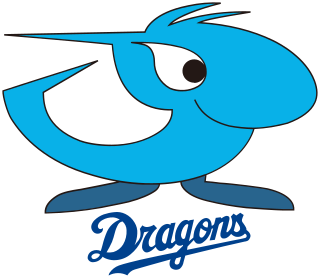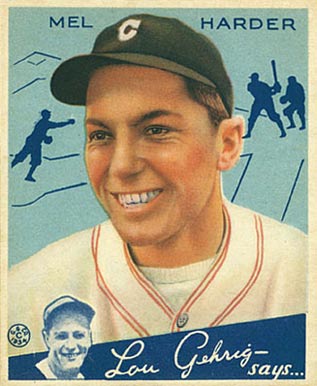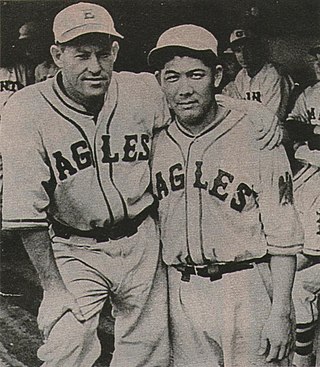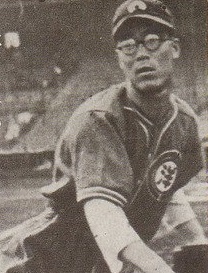
Nippon Professional Baseball is a professional baseball league and the highest level of baseball in Japan. Locally, it is often called Puro Yakyū (プロ野球), meaning simply Professional Baseball; outside of Japan, NPB is often referred to as "Japanese baseball."
The Japan Series, also the Nippon Series, is the annual championship series in Nippon Professional Baseball, the top baseball league in Japan. It is a best-of-seven series between the winning clubs of the league's two circuits, the Central League and the Pacific League, and is played in October or November. The first team to win four games is the overall winner and is declared the Japan Series Champion each year. The Japan Series uses a 2–3–2 format.

The Chunichi Dragons are a professional baseball team based in Nagoya, the chief city in the Chūbu region of Japan. The team plays in the Central League of Nippon Professional Baseball. They have won the Central League pennant nine times and the Japan Series twice. They were also champions in the 2007 Asia Series.
The Japanese Baseball League was a professional baseball league in Japan which operated from 1936 to 1949, before reorganizing in 1950 as Nippon Professional Baseball.

Melvin Leroy Harder, nicknamed "Chief", was an American right-handed starting pitcher, coach and manager in Major League Baseball, who played his entire career with the Cleveland Indians. He spent 36 seasons overall with the Indians, as a player from 1928 to 1947 and as one of the game's most highly regarded pitching coaches from 1948 to 1963. He set franchise records for wins (223), games started (433) and innings pitched which were later broken by Bob Feller, and he still holds the club record of 582 career games pitched. He was among the American League's career leaders in wins (9th), games (8th) and starts (10th) when he retired. He was also an excellent fielder, leading AL pitchers in putouts four times, then a record.
The Black Mist Scandal refers to a series of game fixing scandals in Japan's Nippon Professional Baseball (NPB) league and flat track motorcycle racing between 1969 and 1971. The fallout from these scandals resulted in several star players receiving long suspensions, salary cuts, or being banned from professional play entirely. The scandals led many fans in Japan to abandon the sport, and also to the sale of such illustrious teams as the Nishitetsu Lions and Toei Flyers.

Korakuen Stadium was a stadium in Tokyo, Japan. Completed in 1937, it was originally used for baseball, and was home to the Yomiuri Giants for nearly fifty years. For various periods of time, it was also the home stadium of six other professional Japanese baseball teams, including the Mainichi Orions, the Kokutetsu Swallows, and the Nippon Ham Fighters. Korakuen was the home of the Intercity baseball tournament for nearly fifty years. It originally hosted the Japanese Baseball Hall of Fame, now located at Korakuen's successor venue, the Tokyo Dome. In the 1970s and 1980s Korakuen was also used as a concert venue for superstar performers. The ballpark had a capacity of 50,000 people.

The Shochiku Robins were a Japanese baseball team that played in Nippon Professional Baseball (NPB). The franchise originated in the Japanese Baseball League and existed from 1936–1953, when it merged with the Taiyo Whales. Originally based in Tokyo, the club moved to Osaka in 1941.
The Western League (ウエスタン・リーグ) is one of the two minor leagues ("ni-gun") of Japanese professional baseball. The league is owned and managed by the Pacific League of Nippon Professional Baseball (NPB).

The Nishi Nippon Pirates or Nishinippon Pirates were a former Nippon Professional Baseball team and a founding member of the Central League in 1950. The team was owned by the Nishinippon Shimbun and played their home games in Heiwadai Stadium in Fukuoka. After only one season in which they fell victim to the first perfect game in professional Japanese baseball history, had financial and managerial problems, and finished in sixth place, the Pirates merged with the other Fukuoka-based Nishitetsu Clippers to form the Nishitetsu Lions in the Pacific League.

Harold Henry Schumacher, nicknamed "Prince Hal", was an American professional baseball player and right-handed pitcher who appeared in 391 games pitched in Major League Baseball for the New York Giants. A native of Hinckley, a village in Trenton, New York, he was listed as 6 feet (1.83 m) tall and 190 pounds (86 kg).

Heiwadai Baseball Stadium was a ballpark located in the Fukuoka, Fukuoka Prefecture, Japan. From 1950 to 1978, it served as the home ballpark of the Nishitetsu Lions, a team in Nippon Professional Baseball's (NPB) Pacific League. It also briefly served as the home stadium for NPB teams the Nishi Nippon Pirates in 1950 and the Fukuoka Daiei Hawks from 1989 to 1992. The stadium hosted 1,904 official NPB games in its almost 58-year history.

Takehiko Bessho, born Akira Bessho, was a Japanese baseball player whose professional career as a player lasted from 1942 until 1960. Bessho first achieved fame as a pitcher in Japanese professional baseball; later, he served as a Nippon Professional Baseball (NPB) manager.
The Daiei Stars were a Japanese professional baseball team that was founded in 1946, and played in various incarnations until 1957, when it merged with another team. Overall, the franchise only had three winning seasons, never rising higher than third place. The team was in the second division, or B-class, for seven seasons, including its last four years of existence. The Stars played in Korakuen Stadium in Bunkyo, Tokyo.

The Yamato Baseball Club was a Japanese baseball team in the Japanese Baseball League (JBL). Based in Tokyo, the franchise was founded as the Korakuen Eagles before the 1937 season and was dissolved before the 1944 season.

Nagoya Kinko was a Japanese baseball team that played in the Japanese Baseball League (JBL) before it merged with another team. It was owned by the daily broadsheet Nagoya Shimbun. Notable players for the team over the course of its existence included Harris McGalliard, Herb North, and Toshio Kurosawa.
Saburo Yokozawa (1904–1995) is a Japanese former professional baseball manager and umpire. He was involved in various iterations of Japanese professional baseball from 1929 through 1959.

Jirō Noguchi was a Japanese baseball pitcher and outfielder/infielder who played 13 seasons in the Japanese Baseball League and then Nippon Professional Baseball, from 1939 to 1952. A two-way player who really excelled at pitching, Noguchi was a six-time 20-game winner, a three-time 30-game winner, and once won 40 games in a season. His 1.96 career earned run average is second all-time. As a batter, Noguchi had a 31-game hitting streak, a Japanese professional baseball record which stood for 25 years. He was elected to the Japanese Baseball Hall of Fame in 1989.

Akira Noguchi was a Japanese baseball pitcher, infielder, catcher, and manager who played 15 total seasons in the Japanese Baseball League and then Nippon Professional Baseball, during the period 1936 to 1955. The rare two-way player, Noguchi was particularly unusual in that he excelled in the specialized positions of both pitcher and catcher.













